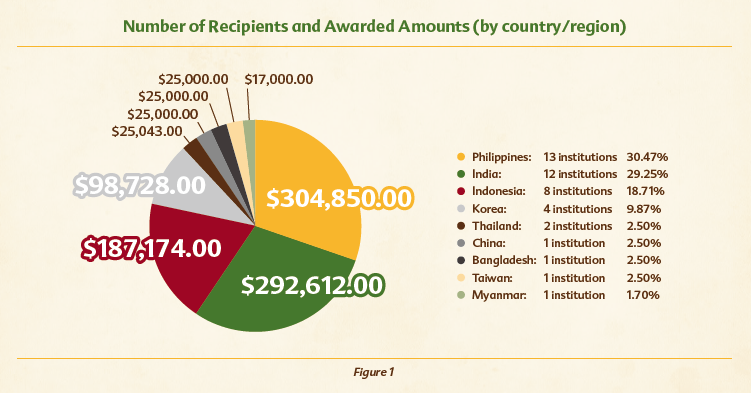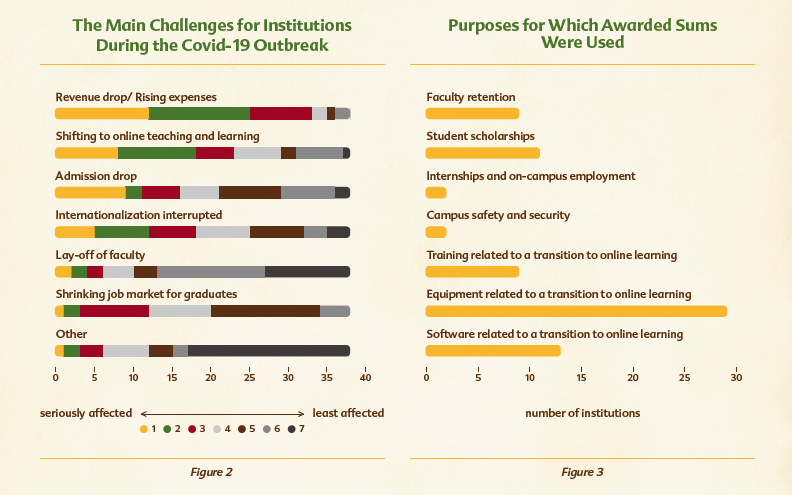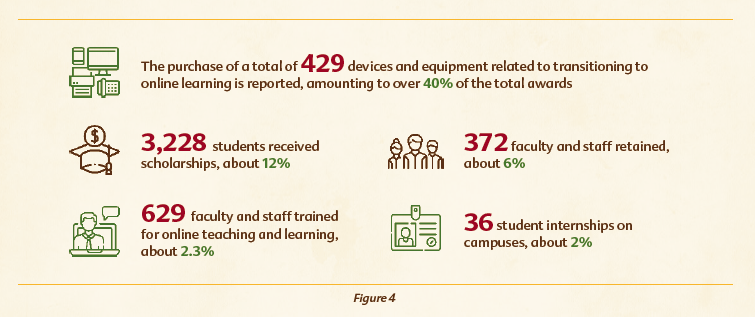
Soon after the COVID-19 pandemic closed borders and schools in 2020, its impact on higher education was not lost to education leaders and institutions. Lockdowns threatened not only students’ opportunities to learn but also teachers’ to teach. The switch to remote learning was more easily made by universities in developed economies than in those of developing ones.
Seeing that immediate response was in order, the United Board set up in 2020 the Pandemic Response Fund with the objective of helping our network institutions meet the challenges of delivering quality education during the pandemic. Specifically, the Fund aimed to support the institutions’ general operating expenses and help them transition to online delivery of classes. Originally USD$500,000 was allotted. Due to the enthusiastic response and after gaining deeper understanding of the prevailing challenges facing the institutions, the United Board increased funding to US$1 million.
As Dr. Judith Bering, Chair of the Pandemic Response Fund Advisory Committee, put it, “The Pandemic Response Fund is a considered response to this once-in-a-lifetime pandemic whose impact is still to be assessed. We aim not only to provide immediate and short-term relief but also prepare our network institutions to adapt to long-term changes in ways appropriate to our missions.”
From October 2020 to January 2021, applications from 44 of the United Board’s network institutions flowed in. In the end, the United Board’s trustees approved grants of up to US$25,000 per grant for 43 institutions. The number of recipients and percentages of awarded sums are in Figure 1.

The United Board did not just sign and send the checks. Our staff had all along been communicating with the applicants, understanding their specific hardships and advising on the best use of the Fund for the best course of action.
A survey conducted among the receiving institutions in March 2021 revealed what major challenges they faced. The majority of respondents reported revenue drops and rising expenses, as well as the challenge of shifting to online teaching and learning due to lack of equipment and the need to upgrade the teaching faculty’s competence on e-learning. (See Figure 2)
It is therefore no surprise that the uses to which the awarded sums were put related primarily to purchasing equipment to make online learning possible, retaining faculty, and helping students through scholarships. (See Figure 3)

The institutions did not just acquire e-learning devices and equipment. As e-learning, in its full or hybrid variety, will conceivably remain a permanent fixture of postpandemic education, many recipients utilized the Fund to invest in hardware and improve their e-learning infrastructure.
Fujian Hwa Nan Women’s College in China built and upgraded their e-learning commons, enabling 12 classes to be conducted there with a capacity of over 400 students. St. Christopher College of Education in Chennai, India established the Digital Learning Support Centre to offer blended learning and online training for students and teachers, paving the way for the design, development and delivery of digital instructional materials for more efficient, effective, engaging and inspiring knowledge transfer.
 The Fund helped keep many students in schools and many teachers teaching them. In Indonesia, the Duta Wacana Christian University (UKDW) established scholarships for 100 students with financial difficulties. Jessica Ivana Wijayanto, a UKDW student in Information Systems, said, “I would like to express my deepest gratitude to the United Board for providing me with a scholarship that has eased the burden of my parents and encouraged me to take this opportunity to be more productive in my studies.”
The Fund helped keep many students in schools and many teachers teaching them. In Indonesia, the Duta Wacana Christian University (UKDW) established scholarships for 100 students with financial difficulties. Jessica Ivana Wijayanto, a UKDW student in Information Systems, said, “I would like to express my deepest gratitude to the United Board for providing me with a scholarship that has eased the burden of my parents and encouraged me to take this opportunity to be more productive in my studies.”
Nearly 240 faculty and staff of the University of St. La Salle (USLS) in the Philippines would have been seriously affected by the pandemic but for USLS’s Agape Fund. Dr. Sheilla M. Trajera, Director of the Center for Linkages and International Affairs of USLS, could not quite control herself when the United Board confirmed its support of the fund: “I was teary eyed…realizing that no one employee making the sacrifice will be left out.”
The United Board is also pleased to see innovative uses of the Pandemic Response Fund by some institutions to take on challenges. For example, Chang Jung Christian University (CJCU) in Taiwan used the money to purchase telepresence robots for exchange students who had to stay behind in their home countries. Controlling the robots through mobile devices, the grounded students could interact through their avatars in the classroom with their teachers and classmates as if they were under the same roof. Encouraged by such success, CJCU has decided to invest henceforth the same amount to support their internationalization efforts.
Ewha Womans University in Korea, another beneficiary of the Fund and a partner of the United Board in promoting women’s leadership in higher education, foresees the need to support women as a socially underprivileged class, as well as the value of women’s leadership research in active disaster relief in the postpandemic era. The Fund will undoubtedly consolidate and further the United Board’s alliance with kindred spirits such as Ewha Womans University to support and foster female leadership training and awareness in Asia.

At the time of writing, the world was still beset by the Omicron variant of the coronavirus. Questions remain whether Omicron is the endnote of the pandemic or other variants of the virus might still lurk around the corner. One way to assess the impact of the Fund is the numbers of devices purchased and people whose financial hardship was relieved, as reported by the recipients and summarized in Figure 4 above.
There are reassuring signs from the survey mentioned above. Seventy-four percent of the respondents reported that the situation at their universities had improved. Further, all the respondents considered their faculty, to varying degrees, not quite up to online teaching before the pandemic. By March 2021, however, their faculty’s competence had significantly improved. A significant change was also reported in students’ access to online learning.
Dr. Nancy Chapman, President of the United Board, saw strengthened relationships and acquired preparedness as the bonuses of administering the Fund. She said, “The Fund helped us to deepen our relationship with our network institutions, and we feel fortunate to have been able to help their members through this difficult time. I think the experience will also help us respond in a prompt and precise manner to other crises in the future.”
